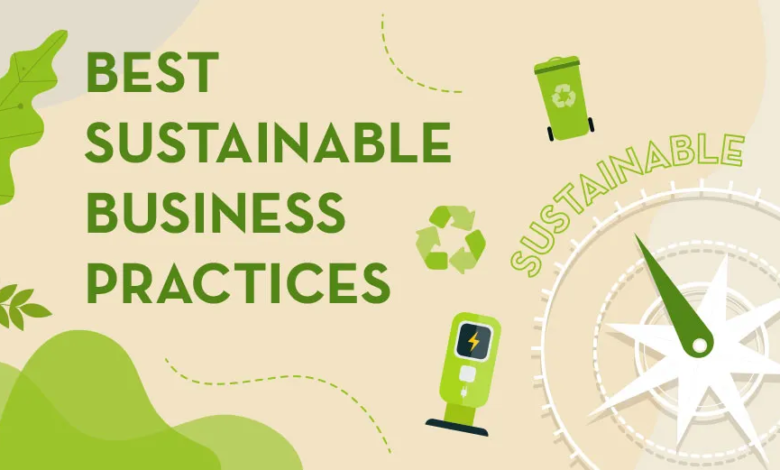Sustainable Business Practices

Do you want to make a difference to the impact your business has on the natural world? You are in the right place, Learn all about sustainable business and how to sharpen up your best practices.
Many organizations considered sustainability issues outside the wheelhouse of business. Companies and consumers are starting to recognise the importance of sustainability and give it a lot more attention. In fact, 92% of consumers admit that they’re more likely to trust brands that are environmentally or socially conscious.
This means that businesses around the world are pouring millions into developing sustainable business practices all jostling to win the hearts and minds of their eco-conscious customers.
What is sustainability in business?
A sustainable business ensures that it’s able to conduct its business activities without negatively impacting the environment, communities, or society as a whole. Just about any business activity will impact the environment in some way, so it’s important businesses recognise this and honor a commitment to be more sustainable.
Sustainability in business can be split into four pillars:
- Social
- Human
- Economic
- Environmental
A sustainable business should aim to make a positive impact on as many of these pillars as possible when making business decisions. Not only is this for the benefit of wider society but it is also to ensure a sustainable future for the business and their customers.
Examples Of Sustainable Business Practices
- Partner With Nonprofit Organizations
Whether you’re interested in racial or gender equity, labor concerns, environmental issues, or something else, a nonprofit likely exists that aligns with your organization’s specific goals.
An employee or sustainability board tasked with generating a sustainability plan for the organization can quickly become overwhelmed, leading to inaction. Many organizations interested in embracing sustainability stop short of implementing any concrete initiatives simply because it’s new to them, and the learning curve can be quite extensive.
One way around this, especially for businesses new to the world of sustainability, is to form partnerships with nonprofit organizations in the space that interests them.
Even those that cannot help you conceptualize or implement policies in your organization will be happy for support, which can help you make an impact even while you’re first getting started.
- Educate Your Employees
The businesses with the most impactful sustainability initiatives are successful because they educate their employees about the issues and include them in the process.
This is important for multiple reasons. Educating your employees increases buy-in throughout the organizational chart, making it less likely that you’ll slip back into old ways.
It empowers your employees to do their part, which can go a long way in boosting morale and helping everyone realize they have a role to play.
It also goes by educating your employees about the issues that your organization cares about, which will depend on your situation.
Some options include:
- weaving language around sustainability into company addresses
- organizing webinars
- Lectures
- Lunch and learning for employees to attend
- purchasing corporate social responsibility training.
- Encourage Volunteerism
Another Interesting means of involving your employees in the sustainability process is to take steps that encourage volunteerism. There are many strategies you might pursue to achieve this goal.
For instance, you might provide paid time off for employees who wish to volunteer, sometimes known as volunteer time off (VTO). Even providing as little as one or two days of VTO per year can go a long way in empowering your employees.
You can consider organizing a company wide volunteer drive or day of giving, wherein your employees are encouraged to volunteer at local charities or for causes they’re passionate about.
- Rethink Your Supply Chain
If your business produces and sells a physical product, analyzing your supply chain has the potential to illuminate significant opportunities to embrace sustainability, such as:
- Sourcing materials responsibly: If you source raw materials or individual components from outside vendors, do you know how these materials are procured? The simple act of ensuring that your partners follow fair labor practices, such as disavowing child labor or embracing fair-trade agreements, can have a lasting impact on your company’s social footprint.
- Reducing consumption of natural resources: While it may not be obvious at first glance, there may be significant opportunities to reduce the number of natural resources your company consumes as a part of doing business. You might, for example, rethink your packaging or streamline your manufacturing process to reduce plastic waste.
- Reducing carbon emissions: There are many ways you might reduce your organization’s carbon emissions. Installing smart sensors within your facilities can ensure that heating, cooling, and electricity are automatically shut off when it isn’t necessary. Moving the production of physical goods closer to the end customer can significantly reduce transportation-related emissions. On-site solar- or wind-power installations can allow you to replace some, if not all, of your electrical needs.
Why is sustainability in business important?
Climate change, fewer natural resources, a growing population, and other major disruptors are all impacting society and the way businesses operate. Therefore, companies must ensure they’re doing their bit to care for the environment and the people they sell their products and services to.
It’s more important than ever that businesses rethink the way they operate. By implementing a sustainable business strategy, they’re able to become more resilient in an ever-changing world, while also helping to preserve the planet and contribute to a greener future.
Conclusion
Embracing sustainability in the business world is not only a responsible choice but also a strategic imperative. By integrating sustainable practices, businesses can mitigate risks, reduce costs, enhance their reputation, and gain a competitive advantage.





